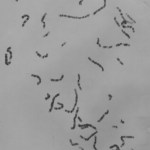Genetic Drift
On Pharyngula, PZ Myers criticizes the stubborn obfuscations of Michael Behe, who refuses to yield his illogical calculations. Behe says (rightly) that a certain mutation necessary for drug resistance in the malaria parasite has about a 1 in 1020 chance of occurring. But the mutation is also detected in 96% of malaria patients who respond well to the drug; it proliferated widely because, by itself, it had no impact on the parasite's fitness. The parasite needed another mutation, occurring at a later date, to develop resistance to the drug. Behe rests his case for divine intervention on the…
If there's one thing about having a demanding day job, it's that the cranks usually have the advantage. They can almost always hit first when a news story comes out that they can spin to attack their detested science. On the other hand, it usually ensures that by the time I get home, have dinner, and settle down in front of the TV with my laptop to discusse the latest bit of science, there's some tasty crankery to deconstruct.
Oddly enough, tonight appears not to be one of those times. Heck, as of this writing, even that wretched hive of antivaccine scum and quackery, Age of Autism,, doesn…
Only 1% of the human genome codes for proteins, which might make you wonder what the rest of the nucleotide sequence is good for. In 2012 the Encyclopedia of DNA Elements (or ENCODE) announced that a full 80% of the genome played a biochemical role, interacting with proteins in some way. But a new study says it takes only about 8% of our non-protein-coding genes to make us human. This is the percentage of genes that are 'conserved' by the human species: change one of these genes, and you'll alter the fitness of the individual. These genes evolve slowly (although not as slowly as protein-…
